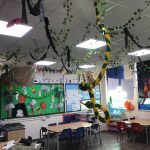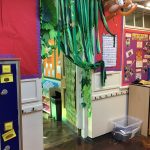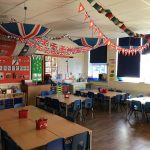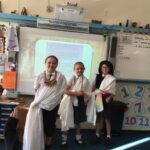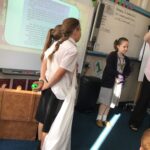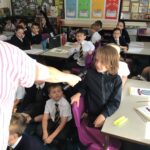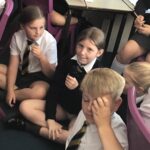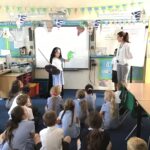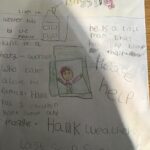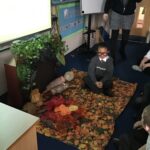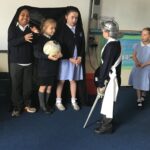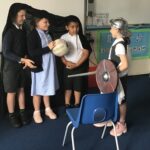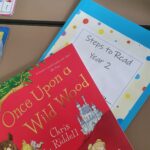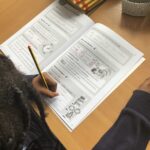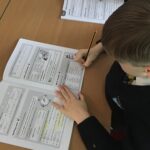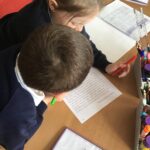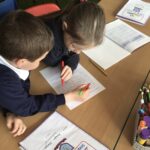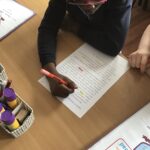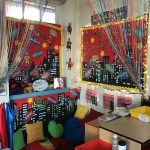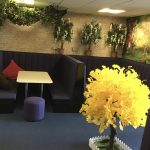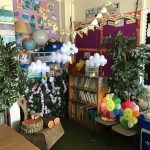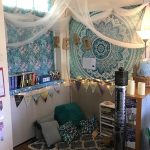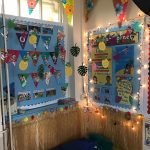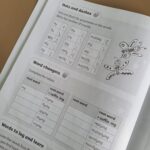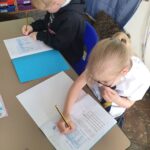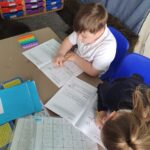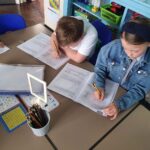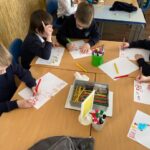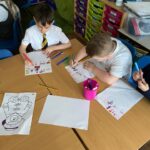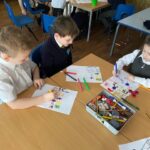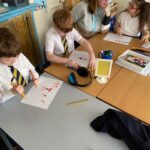At Leamington Community Primary, we have designed our curriculum using a narrative immersion approach which puts stories and drama at the heart of our curriculum. Teachers from Years 1 to Year 6 have worked with Lead Practitioners to create inspiring, thematic schemes of work around rich-themed texts for each half term. Daily provision for English consists of a one hour English lesson, a 35 minute whole-class shared reading or guided-reading session and a 30 minute phonics or spelling session. Handwriting Practice also takes place using Bubble Handwriting scheme and basic skills for English are also developed through other curriculum areas and continually reinforced where appropriate across the curriculum.
Aims
The aims of our English Curriculum are for children to:
- read easily, fluently and with good understanding
- develop the skills of prediction, questioning, deduction, inference, draw on prior reading and summarise.
- develop the habit of reading widely and often, for both pleasure and information.
- acquire a wide vocabulary, an understanding of grammar and knowledge of linguistic conventions for reading, writing and spoken language.
- write clearly, accurately and coherently, adapting their language and style in and for a range of contexts, purposes and audiences.
- use discussion in order to learn; they should be able to explain clearly their understanding and ideas.
- ensure they are competent in the arts of speaking and listening, making formal presentations, demonstrating to others and participating in debate.
- be able to explain, reason, justify and process talk
Daily English Lessons and Narrative Immersion
Throughout the year, the children will explore 6 core texts which act as vehicles to access knowledge and understanding in a range of different subject areas.
The core texts are fundamentally explored in the one hour daily English lesson where children are fully immersed in the imaginary world of the text through a range Narrative Immersion techniques and dramatic conventions in a multi-sensory classroom. This enables the children to make emotional connections to the text and ensures their learning is memorable. Through this approach to learning, the children are given the opportunity to access different genres of text and develop the Reading, Writing, Speaking and Listening skills set out in the National Curriculum as well as develop deeper thinking skills and emotional intelligence.
Reading
Steps to Read
As an approach to improving progress in reading and a solution closing the gaps caused by lockdown, we have worked closely with Literacy Counts to implement a new whole class shared reading scheme which aims to enrich our immersive curriculum and increase the children’s exposure to quality fiction and non-fiction texts.
By introducing shared reading lessons to the curriculum, we are not only developing comprehension skills and improving children’s knowledge and understanding in a range of broad and balanced subject areas, we are explicitly teaching children skills that will make them expert readers such as prediction, questioning, deduction, inference, drawing on prior reading and summarising. We are also helping children to develop oracy skills such as retelling, explaining, reasoning, justifying, process talk and collaborating with others as well as rich ambitious and archaic vocabulary. We also believe that through this scheme we are teaching an awareness of linguistic conventions as well as developing a love of reading.
Guided Read
In KS1 children each child has two guided reading sessions per week; once with a teacher or once with an LSO. In KS2, children have at least 1 session. This gives the opportunity for the teacher to regularly assess the reading ability of each child in their class and choose appropriate texts for their reading age. This is where children are taught to develop their decoding, fluency and comprehension skills. There is also opportunity to address gaps in learning, develop phonological awareness, spelling rules and common exception words.
Phonics, Spelling and Early Reading
EYFS
When children come into Nursery they are exposed to lots of books and printed material with familiar people and encouraged to handle books with care and interest. They join in songs and rhyming activities as part of the Communication, Language and Literacy areas of learning. This supports linking sounds and letters in the order in which they occur in words, and naming and sounding the letters of the alphabet. Children experience a wealth of listening activities, including songs, stories and rhymes. They learn to distinguish between speech sounds and many will be able to blend and segment words orally.
Phonics
At Leamington, we follow the ‘Read, Write Inc Phonics’ scheme of work followed by the Read Write Inc Spelling scheme of work. We chose to incorporate these schemes in addition to our daily English lessons as we felt it was a progressive, effective whole school approach which gets children reading and spelling quickly and successfully.
When children are ready, they enter set 1 and are taught the first 30 sounds from the Read Write Inc phonics scheme. While many children will be able to read and spell CVC words, they all should be able to blend and segment CVC words orally.
Children then enter set 2 where they are taught the next 12 graphemes and are able to blend phonemes to read words and segment words for spelling. They will have some experience in reading simple two-syllable words and captions. They are taught letter names and are able to read and spell some common exception words. During this set, they are taught each long vowel sound and how it is written.
Children entering Set 3 are taught the next 20 graphemes and that there are more ways in which the same sounds are written. They are taught to read and spell words containing adjacent consonants and some polysyllabic words.
Throughout the scheme children will learn to:
- decode words (Fred Talk),
- read words automatically if they are very familiar (Fred in your head);
- decode words quickly and silently because their sounding and blending routine is well established (speedy words).
Please click on this page for further support with reading – Read Write Inc Phonics Support
Fresh Start
For children in years 5 and 6 who are not yet ready for the RWI spelling programme we have invested in a phonics provision called RWI Fresh start. This is a phonics programme which follows the same format as the RWI phonics programme but with more age appropriate content for older children.
Reading Scheme
To ensure we have a cohesive approach to learning, this we year we have invested heavily in our reading scheme to ensure that children have exposure to decodable book bag books which match the sounds they are learning in school.
As recommended by Read Write Inc phonics, the children are exposed to the sounds they are learning, within a text, 3 times at school. They are then given a copy of the same text to read at home as their home reader several times before they are given a different home reader with the same sound. We believe this repetitive reading approach will have a huge impact on progress in reading. Once children have completed the phonics scheme and are ready to access the spelling scheme, they are then reading to access the other texts in our rich and varied reading scheme.
At Leamington our reading scheme contains a wide variety of different books from different publishers. The books are colour coded and suitable for all ages from foundation to advanced readers post Key Stage 2. The bands are used as an approximate estimate given the range of material we use in the school.
Our Library, Reading corners and Reading for pleasure
At Leamington, we aim to promote a love for reading and reading for pleasure. Our school library and reading corners have been transformed into engaging settings where the children can be completely immersed in the books they are reading. We have created a comfortable space where the children can read, work and enjoy quiet time. We continually invest in new reading books for our library and our classroom reading corners as well as a range of new exciting fiction and non-fiction books to enrich our immersive curriculum. The children love exploring the new books as we introduce them and teachers are encouraged to sign post children to books they will enjoy but also challenge them appropriately.
We carefully select the books we buy based on children’s preferences, recommendations from reading spines and books which represent people from all walks of life. At Leamington, we want children to identify with heroes from a range of ethnic and cultural backgrounds, genders and disabilities.
Please take a look at important Reading Milestones.
Writing
SPaG
At Leamington Community Primary School, we feel it is important to develop a good understanding of spelling, punctuation and grammar (SPaG) in order to empower children and strengthen their writing and reading throughout their time at school. The children are taught phonics and spelling discretely through the Read Write Inc phonics and spelling programmes each day, in addition to their daily English lesson. Grammar and punctuation are sometimes taught directly through stand-alone SPaG sessions but more commonly within the English units of work. Each week, teachers carefully identify on their planning which spelling, grammar and punctuation objectives they are going to introduce or reinforce. This is often determined by the areas of need identified from the previous week’s learning or the genre of writing being taught that week. We believe that SPaG rules should be constantly reinforced in all curriculum areas where appropriate.
We have a variety of SPaG board games and interactive whiteboard games in each classroom which have a strong impact on progress and the children love playing. We also have a bank of activities created and shared by teachers within school. Every classroom (year 1-year 6) contains a SPaG display which includes helpful vocabulary and Spag rules. Children are tested on both their spelling and their punctuation and grammar as part of their SATs at the end of Key Stage 2.
Spelling
Due to the impact of the RWI phonics scheme on progress, as a school we decided to introduce the Spelling Programme from Year 2 to 6 to enable to allow us meet the spelling expectations of the National Curriculum 2014, to raise standards in spelling, to provide consistency and progression in the teaching of spelling and to help support children to enable them to be more confident at spelling.
RWI Spelling is an interactive programme which teaches spellings in a fun and engaging way. Each unit is introduced with a short video. It helps children to learn spellings with common patterns and uses rules in order to help them recall spellings as well as teaching exceptions to these rules.
Individual workbooks allow children to practise their spellings and the teaching naturally follows on from Read Write Inc: phonics. This works well as children are already proficient at using dots (for individual sounds) and dashes (for digraphs). Although the teaching of phoneme-grapheme correspondence underpins this programme, the spelling programme also develops children’s knowledge of word families, and how prefixes and suffixes can be added to root words to help them to spell with greater accuracy, understanding and confidence. The children are also taught mnemonics, songs and phrases to remember the trickiest spellings.
Writing
Immersive writing
Each half term, the children will build up to at least 2 pieces of independent writing. This will come at the end of each unit of work based around a genre of text. The work is a culmination of all the learning that has taken place across the unit. At the start of each unit, the children are immersed in examples of quality text from a specific genre. They then look closely at the features of that genre and unpick the structural and language features. They may also look at subject specific vocabulary. From here, the children will look closely at each feature in more detail and will finally learn to plan, write an edit a piece of writing independently.
This writing is done in a separate book to the children’s day to day English book called their ‘Immersive Write Books’. The children take great pride in these books and they show progression in writing across the year. In Key Stage 2, these books follow the children up the school which shows progression in writing from Year 3 to Year 6.
Children also use elements of Pie Corbett’s Talk 4 Writing model to unpick texts and build vocabulary to support their writing. Children orally re-tell stories and compose their own versions before publishing in a range of ways.
Assessment
After each Immersive write, teachers identify strengths and areas for development in writing which informs their planning for the following week. Teachers mark against writing expectations for each year group taken from the National Curriculum. Teachers also assess writing daily, where possible with children in order to give immediate verbal feedback. At the end of Key Stage 1 and 2, children’s writing is assessed using pieces writing taken from foundation subjects. This is then moderated internally and externally.
Assessment
After each Immersive write, teachers identify strengths and areas for development in writing which informs their planning for the following week. Teachers mark against writing expectations for each year group taken from the National Curriculum. Teachers also assess writing daily, where possible with children in order to give immediate verbal feedback. At the end of Key Stage 1 and 2, children’s writing is assessed using pieces writing taken from foundation subjects. This is then moderated internally and externally.
Extra Provision
Supporting children’s mental health
At Leamington children’s mental health and wellbeing is priority to give the children the support to thrive. During our wellbeing Wednesday afternoon sessions many of the mental health themes are introduced to the children through stories. Within the sessions, these themes are developed and understood by the children using their speaking and listening skills, as a class they take part in circle time and whole class discussions.
Knowledge, Understanding and Skills
Primary National Curriculum – English
Subject Leaders: Jennifer Marshall


